The Neophyte's Custom Liquid Cooling Guide: How To, Why To, What To Expect
by Dustin Sklavos on September 30, 2013 12:01 AM ESTPart of the purpose of this article is to help quantify just how much of a performance boost an individual can obtain by overclocking their system. Watercooling or not, modern hardware typically has a healthy amount of headroom that can be exploited for additional performance.
At stock, our system ran its Intel Core i7-4770K at 3.7GHz on all four cores (3.9GHz on a single core) and the pair of GTX 780s at reference clocks.
The air overclock ran its i7-4770K at 4.3GHz on all four cores and the pair of GTX 780s with a +125 offset on the GPUs and 7.1GHz on the GDDR5.
The liquid overclock ran its i7-4770K at 4.4GHz on all four cores and the pair of GTX 780s with a +135 offset, with a stable boost at 1160MHz, and 7.1GHz on the GDDR5.
We'll start with the PCMark tests.
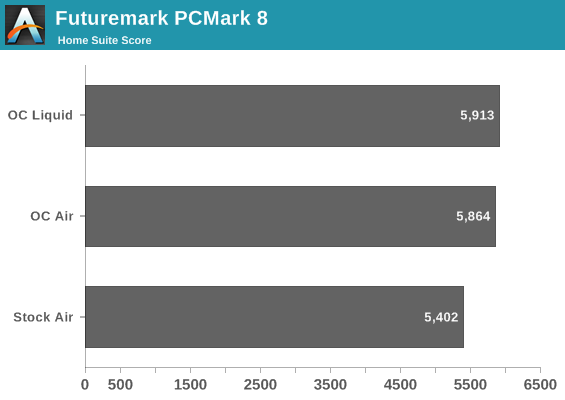
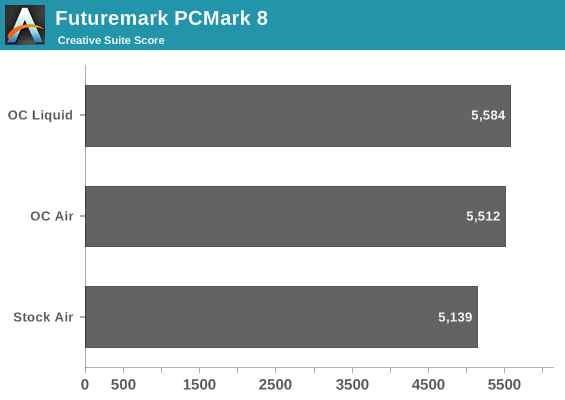
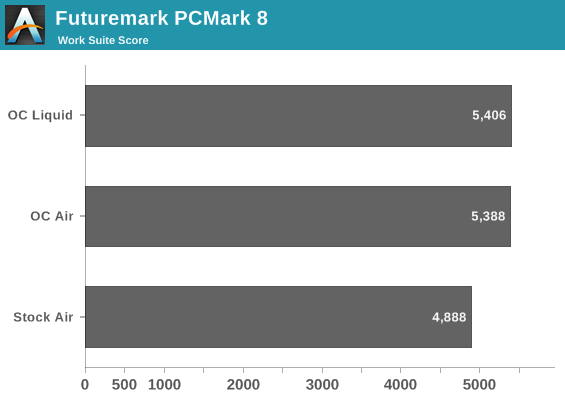
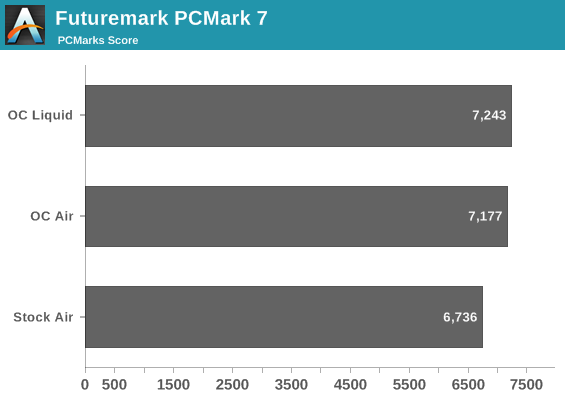
Our biggest jump came, naturally, from going from an effective 3.7GHz to 4.3GHz. The extra 100MHz on water improves scores across the board, but only marginally.
Next, we'll isolate CPU performance completely with Cinebench and the x264 benchmark.
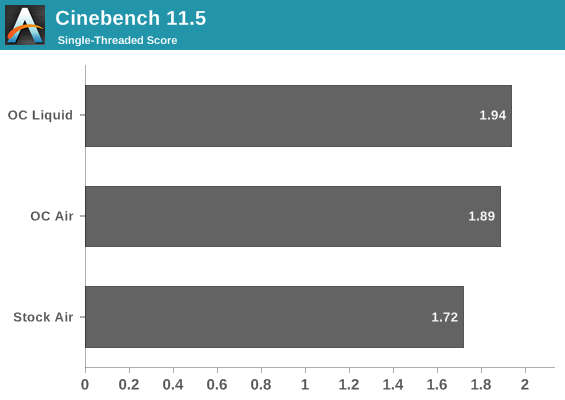
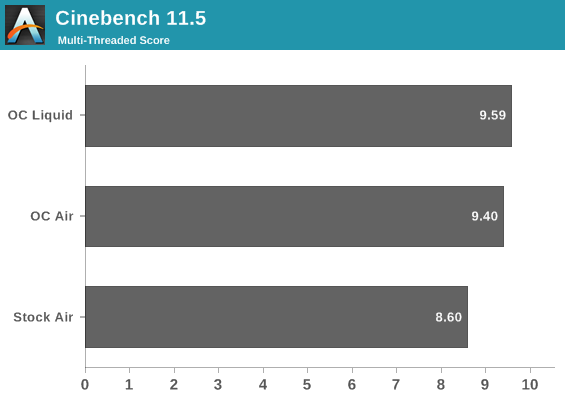
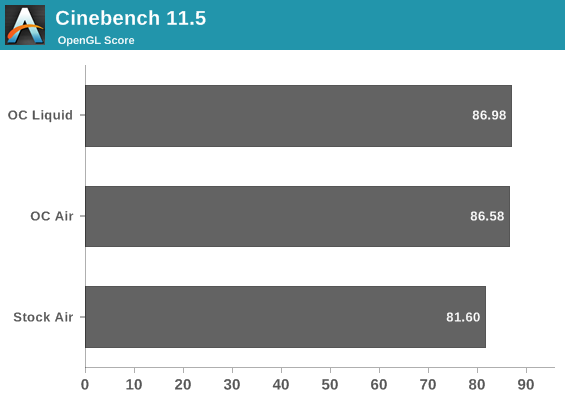
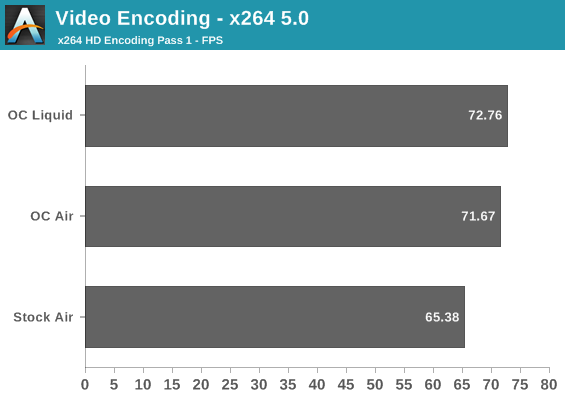
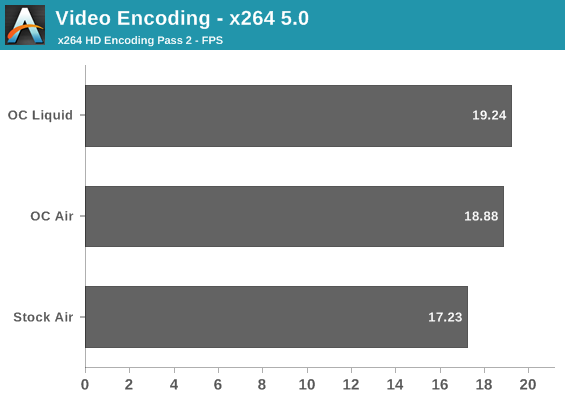
Again there's a healthy boost across the board, but the effort to get 4.4GHz just doesn't seem worth it for CPU centric tasks. 4.3GHz and DDR3-2133 wasn't too difficult for this chip and is probably the way to go; 4.4GHz brings a lot of heartache for not much gain.










106 Comments
View All Comments
bojaka - Monday, September 30, 2013 - link
And right about THERE I lost my interest in water cooling - Thanks :) I actually believed water cooling would be a viable solution to make my computer silent, but apparently not. Thanks for a great article!!utnorris - Monday, September 30, 2013 - link
You can make a near dead silent water cooled system that allows you to overclock. Unfortunately, the fans you are using in the article, while good, are not the best, regardless what marketing says. I have built probably 40 to 50 systems over the last 5 years using water cooling and noise was never an issue. If you are not overclocking then a full blown water cooling setup is not worth it, but for the added performance, it's well worth it. Also, there is no need for additives like the Hydrx, distilled water with a silver coil or some anti algae drops from your local pet store is all you need and would be less toxic. Last, as already mentioned, delidding would have seen about 10c drop on the processor and if you are going to water cool, you might as well delid your chip.Aikouka - Monday, September 30, 2013 - link
You REALLY shouldn't take a SINGLE article on water cooling as the end all, be all on whether water cooling can provide a silent build. Dustin was NOT pushing for a silent build, but rather just a build with whatever parts he was provided. I have a custom loop with an i7-4770k and two GTX 680s, and it isn't noisy at all. It is going to be a bit noisier at idle because of having significantly more fans (I have 7 120mm fans just on the radiators), but it doesn't get any noisier at load! I also use a fan controller that lets me set the fans to the speed -- and consequently, the noise level -- that I find acceptable.piroroadkill - Monday, September 30, 2013 - link
Yeah, some people think this, but since you're shifting water at the same time as pushing air, there are simply more moving parts involved. Just get a giant tower heatsink and run those fans sloooowly, and choose a GPU with a really good factory heatsink.tim851 - Monday, September 30, 2013 - link
Depends. There are much better, i.e. quieter, pumps available. The best one imo is the Aquastream by AquaComputer. Even then, a single Cpu-single Gpu system is quieter on air. A Thermalright HR-02 and an Accelero Xtreme will take care of it. Once you go SLI, however, you're running into space and heat evacuation problems. Watercooling is your only chance of acceptable noise at load now.piroroadkill - Monday, September 30, 2013 - link
Yeah, multi-GPU rigs are a different beast. At that point a custom water loop is probably your best bet.But for single CPU/single GPU rigs, water is basically a vanity project, not one that will actually give you lower noise.
piklar - Monday, September 30, 2013 - link
Great article Dustin! It just so happens I have been considering a watercooling project this summer (new Zealand time) using the Corsair Air540 with 4770K and SLI GTX 780s. Ironicly it appears The Raven RV03 is doing just as good if not better job of the cooling with Corsair H80 and reference card cooling. You have shown how luck of the draw Haswell can be since the 4770Ks Ive come across all do 4.6ghz on 2.8- 3.0v no probs. Still your article was very useful and much appreciated.Death666Angel - Monday, September 30, 2013 - link
2.8V to 3.0V? That's not right. :PRazorbak86 - Monday, September 30, 2013 - link
LOL. My thought exactly. I'm sure he meant 1.28-1.30V. ;-Ppiklar - Monday, September 30, 2013 - link
soz was half asleep, thanks for clarifying that I meant meant 1.280 - 1.30V for 4.6ghz with 4770K with H80.